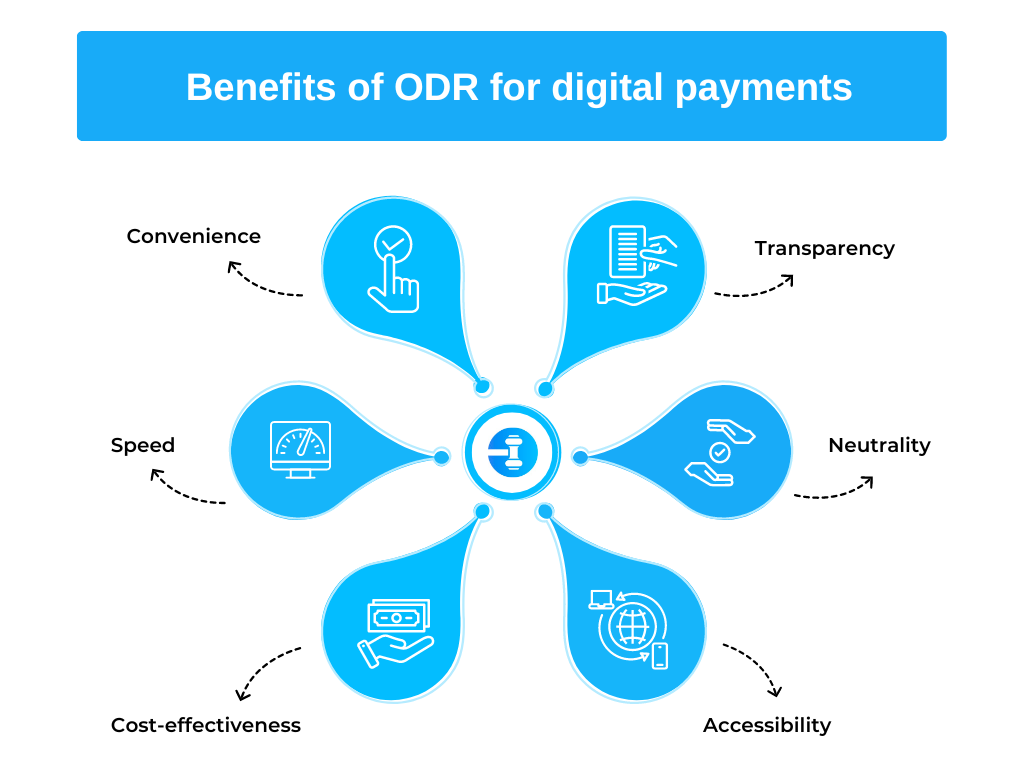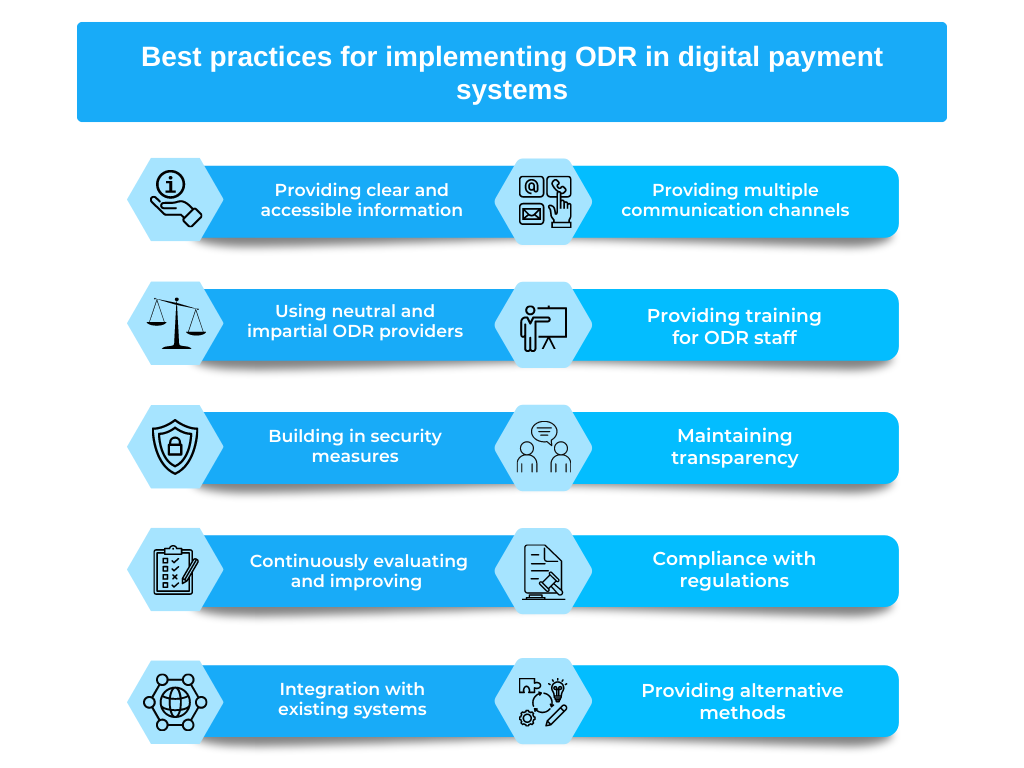ODR in Digital Payments
In today’s digital age, online transactions and digital payments have become an integral part of our daily lives. However, with the increase in online transactions, disputes between buyers and sellers have also become more common. Traditional methods of dispute resolution, such as going to court, can be time-consuming and costly, making them less suitable for resolving disputes in the digital payments space. Online Dispute Resolution (ODR) is a modern alternative that allows parties to resolve disputes quickly, efficiently, and cost-effectively.
In this article, we will explore the benefits of ODR for digital payments, the different types of ODR methods available, and best practices for implementing ODR in digital payment systems. Whether you are a business owner, a consumer, or a payment service provider, this guide will provide valuable insights on how to navigate disputes in the digital payments space.
Benefits of ODR for digital payments
Online dispute resolution can provide several benefits for digital payments, including:
- Convenience: Online dispute resolution in payment allows disputes to be resolved remotely, eliminating the need for in-person meetings or court appearances.
- Speed: ODR processes can often be completed more quickly than traditional dispute resolution methods.
- Cost-effectiveness: ODR can be less expensive than hiring a lawyer or going to court.
- Accessibility: ODR can provide a more accessible option for individuals who may have difficulty accessing traditional dispute resolution methods, such as those in remote areas or with disabilities.
- Neutrality: ODR platforms can be neutral and impartial, providing a fair and unbiased process for resolving disputes.
- Transparency: ODR platforms can provide a transparent and well-documented process for resolving disputes, which can be helpful for parties to understand the reasoning behind a decision.

Types of ODR methods for digital payments
Online Dispute Resolution in payment can be of several types, including:
- Mediation: This method involves a neutral third party (the mediator) who facilitates communication and negotiation between the parties to help them reach a mutually acceptable resolution.
- Arbitration: This method involves a neutral third party (the arbitrator) who acts as a judge and makes a binding decision based on the evidence presented by the parties.
- Facilitation: This method involves a neutral third party (the facilitator) who helps the parties to identify the issues in dispute and develop options for resolving them.
- Negotiation: This method involves the parties communicating directly with each other to try to resolve the dispute on their own, without the assistance of a neutral third party.
- Expert determination: This method involves a neutral third party (the expert) who has specialized knowledge or expertise relevant to the dispute, and who makes a binding decision based on the evidence presented by the parties.
- Hybrid Methods: Combination of the above methods.
It is important to note that different ODR methods may be more or less appropriate depending on the specific dispute and the parties involved. In some cases, a combination of ODR methods may be used.
Best practices for implementing ODR in digital payment systems
There are several best practices that organizations can follow when implementing online dispute resolution in payment systems, including:
- Providing clear and accessible information: Organizations should provide clear and easily accessible information on their ODR process, including how to initiate a dispute, what types of disputes are eligible, and what the expected timeframe is for resolution.
- Providing multiple communication channels: Organizations should provide multiple communication channels, such as email, phone, and live chat, to allow customers to initiate disputes and communicate with the ODR team.
- Using neutral and impartial ODR providers: Organizations should use neutral and impartial ODR providers who have the necessary expertise and experience to handle disputes in the digital payment space.
- Providing training for ODR staff: Organizations should provide training for ODR staff on the relevant laws, regulations, and industry best practices related to digital payments and dispute resolution.
- Building in security measures: Organizations should implement security measures to protect sensitive customer information during the ODR process.
- Maintaining transparency: Organizations should maintain transparency throughout the ODR process, providing regular updates on the status of the dispute and ensuring that the resolution is communicated to the customer.
- Continuously evaluating and improving the ODR process: Organizations should continuously evaluate and improve their ODR process to ensure that it is efficient, fair, and effective. This can be done by regularly collecting feedback from customers and ODR staff, and by analyzing dispute resolution data to identify and address any issues.
- Compliance with regulations: Organizations should ensure that their ODR process is compliant with all relevant laws and regulations, including data protection and consumer protection laws.
- Integration with existing systems: Organizations should ensure that the ODR process is integrated with existing systems, such as customer relationship management (CRM) and payment systems, to facilitate a smooth and efficient dispute resolution process.
- Providing alternative methods: Organizations should also provide alternative methods of dispute resolution for customers who are not satisfied with the ODR process, such as an internal review or escalation to a higher authority.

Next steps for implementing online dispute resolution in the payment system
In conclusion, implementing online dispute resolution in payment systems can provide several benefits such as convenience, speed, cost-effectiveness, accessibility, neutrality, and transparency. To ensure that the ODR process is effective, organizations should follow best practices such as providing clear and accessible information, using neutral and impartial ODR providers, providing training for ODR staff, building in security measures, maintaining transparency, continuously evaluating and improving the ODR process, ensuring compliance with regulations, integrating the ODR process with existing systems, and providing alternative methods of dispute resolution.
The next steps for implementing online dispute resolution in payment systems would be to conduct a thorough assessment of the organization’s current dispute resolution process and identify areas for improvement. This can be done by collecting feedback from customers and ODR staff and analyzing dispute resolution data. Once the areas for improvement have been identified, the organization can then design and implement an ODR process that is tailored to their specific needs and that aligns with best practices. It is also important to test the ODR process and make any necessary adjustments before fully rolling it out to customers.
After the ODR process has been implemented, organizations should continuously monitor and evaluate the process to ensure that it is efficient, fair, and effective. This can be done by collecting feedback from customers and ODR staff, analyzing dispute resolution data, and making any necessary adjustments to the ODR process.
It’s also important to note that to ensure a smooth ODR process, it’s important to inform customers of the ODR process and how to access it. This can be done through the website, email, or by providing a customer service team that is well-trained in the ODR process.
Additional resources for ODR in digital payments
There are several resources available for organizations looking to learn more about online dispute resolution (ODR) in digital payments, including:
- UNICITRAL Model Law on Electronic Commerce: This model law provides a framework for the legal recognition and regulation of electronic commerce, including ODR. It can be found on the United Nations Commission on International Trade Law (UNCITRAL) website.
- Online Dispute Resolution for Consumer Disputes (ODR Regulation): This EU regulation lays down the rules for ODR of consumer disputes and the establishment of an EU ODR platform. It can be found on the European Commission website.
- WIPO Mediation and Arbitration Rules: These rules provide a framework for the mediation and arbitration of disputes related to intellectual property, including disputes related to digital payments. They can be found on the World Intellectual Property Organization (WIPO) website.
- Online Dispute Resolution: A Guide for Business and Consumers: This guide, provided by the European Commission, provides information on ODR for businesses and consumers, including the benefits and how to use ODR.
- International Association for Online Dispute Resolution (IAODR): This is a professional organization that promotes the use of ODR and provides training, resources, and networking opportunities for ODR practitioners.
- ODR Platforms: There are various ODR platforms available such as the EU Online Dispute Resolution platform, SquareTrade, Resolver, etc. which can be used for digital payment disputes.
It’s important to note that it’s always a good idea to consult with legal professionals and experts to ensure compliance with laws and regulations.